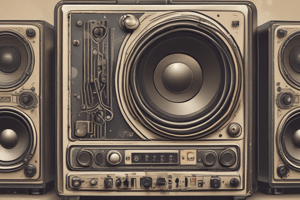Podcast
Questions and Answers
What is the purpose of the amplifier in the system?
What is the purpose of the amplifier in the system?
- To detect sound waves
- To convert sound waves into electrical signals
- To increase the strength of the electrical signal (correct)
- To convert electrical signals back into sound
What would happen if the microphone were not included in the system?
What would happen if the microphone were not included in the system?
- The amplifier would receive a stronger signal
- The amplifier would receive a weaker signal
- The amplifier couldn't handle the sound (correct)
- The loudspeaker would produce a louder sound
What is the function of transducers in general?
What is the function of transducers in general?
- To convert one physical quantity to another (correct)
- To monitor and control systems
- To produce sound waves
- To amplify electrical signals
What is the classification of the microphone in the system?
What is the classification of the microphone in the system?
What is the role of the loudspeaker in the system?
What is the role of the loudspeaker in the system?
What is the purpose of transducers in monitoring and control systems?
What is the purpose of transducers in monitoring and control systems?
What is the primary role of sensors in a system?
What is the primary role of sensors in a system?
What type of transducer is used to sense a wide range of energy forms?
What type of transducer is used to sense a wide range of energy forms?
What is the function of an actuator in a system?
What is the function of an actuator in a system?
What type of actuator is used to provide movement?
What type of actuator is used to provide movement?
What is an example of an actuator that produces light?
What is an example of an actuator that produces light?
What is the purpose of a buzzer in a microwave oven?
What is the purpose of a buzzer in a microwave oven?
Flashcards are hidden until you start studying
Study Notes
Sound System Components
- A microphone detects sound waves and converts them into an electrical signal.
- The amplifier receives the signal and increases its strength.
- The amplified electrical signal is transmitted to the loudspeaker, which converts it back into sound.
Transducers
- Transducers convert one physical quantity to another physical quantity, or one form of energy into another.
- Electrical transducers convert physical quantities like sound, speed, or light into electrical quantities.
- Mechanical transducers convert physical quantities into mechanical quantities, like displacement, pressure, or force.
Input and Output Transducers
- Input transducers, or sensors, convert physical events into electrical signals.
- Output transducers, or actuators, convert electrical or other forms of energy into physical events.
- The microphone is an input transducer, while the loudspeaker is an output transducer.
Importance of Transducers
- Transducers are essential in monitoring and control systems.
- They provide input and output data, enabling interaction with the surrounding environment.
Sensors
- Sensors detect physical changes in the form of energy and convert them into signals.
- They play a crucial role in the data acquisition process, providing information to keep desired parameters and processes under control.
- Sensors can detect various energy forms, including movement, electrical signals, thermal or magnetic energy.
Actuators
- Actuators perform output functions, controlling and modifying processes or machine operations.
- Examples of actuators include motors, light bulbs, LEDs, buzzers, heaters, and sirens.
- Motors provide movement, light bulbs and LEDs provide light, buzzers produce noise, and heaters regulate temperature.
Studying That Suits You
Use AI to generate personalized quizzes and flashcards to suit your learning preferences.



